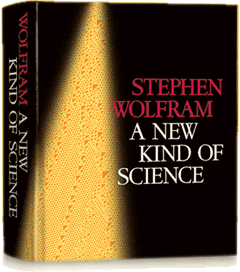The concepts can be hard to digest all in one swallow, but the gist is this: math and science wonks like to tackle a particular part of a problem and then reduce it to a very specific formula (say, E=mc²); while computer programmers tend to write very complicated code so that their programs can do relatively simple but specific tasks (like the thousands of lines of coding needed to create a word processing program so you can type up a sentence like this one). But if you write a very simple and general piece of code that doesn't create something very specific, but instead is designed to generate a lot of variations, then the results can be astoundingly complex. This in turn raises the argument that a simple program is a more powerful tool than a simple formula in terms of reducing the math and science of life to its fundamental roots.

The need for traditional mathematics and science still exists, and conventional formulas might be used within the programs themselves, but what is radical about Wolfram’s thinking is that neither creating a super-complex program or searching for the ultimate, compact mathematical formula is going to solve every problem. Instead, thinking in terms of simple programs and the complex results that can result from running those programs over a long period of time might lead to answers otherwise unattainable.
So while biological scientists have been able to figure out that the make up of all forms of known life can be traced back to what is currently called DNA, and the scientists continue to crack the puzzle of various DNA combinations, in the end no simple formula may ever explain how all of the possible DNA combinations relate to each other; but a program, using known DNA code as it’s base variables, could be written that would generate all DNA combinations, and thus help show us the likelihood of, say, a human developing from the muck instead of a dolphin.
For instance, a formula like E=mc² alone will never explain how a turtle evolved from a microbe, but a program could (theoretically) be written to trace the evolutionary development of the turtle's DNA while also generating the thousands of other possibilities of organisms that might have developed under different circumstances.
Anti-evolutionists that have evolved from simple creationist dogma on to Intelligent Design theory hold forth that Darwin's theory of evolution cannot explain the complexity of the creatures that now exist (especially man), so therefore a "watchmaker" (God) must have designed the basic templates. Wolfram's concept, however, shows that very simple programming code could generate all manner of results. Combine Wolfram's concepts with modern DNA studies and Darwin's concept of survival of the fittest and a more defendable view of evolution begins to emerge.
Wolfram sees his theories as being the “new math”—a math that may one day be used to explain the underlying processes that drive biological, social, and physical systems. Life, the universe, the stock market, music, art, sex, cellphone ringtones, etc.: All traceable back to the results derived from instructions (a.k.a. programs) generating all variations of repeatable processes and formulas under a confined set of conditions.
Of course, that’s just my own, highly inflammable, arguably off-the-mark interpretation of his theories. Look into it for yourself and discover the controversy and insight of Wolfram and his contemporaries (and try not to get distracted by all the claims of plagiarism and "I discovered that first" battles flying back and forth between all these modern thinkers, including Wolfram, that are ready to claim a seat of glory next to Einstein, Aristotle, Newton, et al.)
***
Related Post: "The Apocalyptic Battle Between Science, Religion, Republicans, the Environment, and Those Dreaded Neo-Hippies"

Not Related Post: Brian M. Palmer likes indie music, comics, comedy, and Arrested Development (AD). Thus, he is a good guy. Check out his exclusive and amusing interviews with various AD cast members.
Use It: David Harper recommends TheSage, a stupendous Dictionary-Thesaurus freeware program that trumps most related software I've seen, including some of the better dictionary websites and expensive stand-alone programs. Looking at the results, examples, and cross-references TheSage generates, the word "exhaustive" comes to mind -- although it's certainly not exhausting to use.
I also like the more simplistic, fast-loading WordWeb shareware program-- a powerful, international Dictionary-Thesaurus that you can set up to always run in the background (it doesn't use up much of your computer's resources): Highlight any word in any program and then click ctrl-W and boom!, WordWeb pops up with the definition, correct spelling, related words, etc. I use WordWeb all the time, at home and at work.




No comments:
Post a Comment